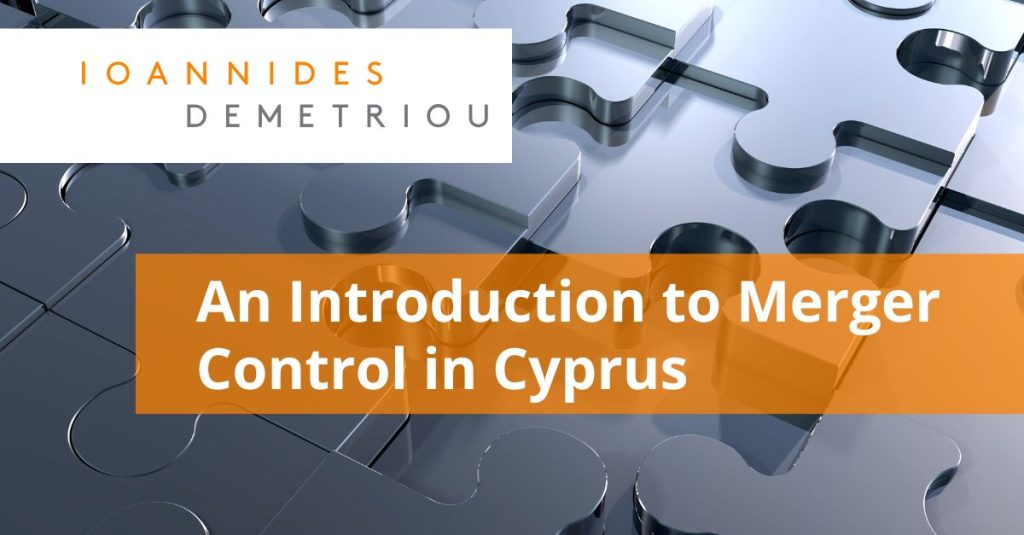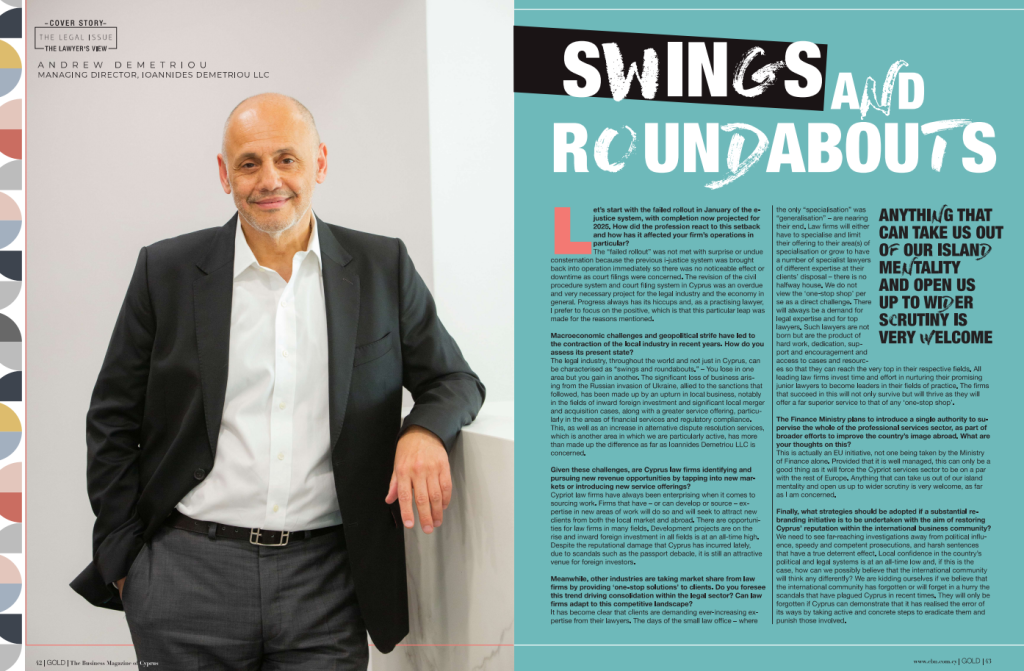Το άρθρο του Φιλελεύθερου ημερομηνίας 14.10.2025 και με τίτλο «Ελεγκτική Υπηρεσία: Τρεις εργολάβοι έκαναν κουμάντο σε δημόσια έργα €2,5 δισ. με ποσοστό 40,8% – Δείτε ποιοι είναι και πόσα εισέπραξαν» πρόσφατα πυροδότησε την δημόσια συζήτηση γύρω από τις δημόσιες συμβάσεις. Στα πλαίσια αυτής της δημόσιας συζήτησης προέκυψε μάλιστα και κόντρα μεταξύ του κ. Οδυσσέα Μιχαηλίδη και του κ. Νικόλα Παπαδόπουλου στην πλατφόρμα Χ (πρώην Twitter) την οποία κάλυψε ο Φιλελεύθερος με άλλο άρθρο ημερομηνίας 17.10.2025 και με τίτλο «Κόντρα Νικόλα-Οδυσσέα για τις δημόσιες συμβάσεις: «Φέσωσες την οικοδομική βιομηχανία με μονοπώλια» – «Υιοθέτησες την προπαγάνδα της Κυβέρνησης Αναστασιάδη».
Σχολιάζοντας το περιεχόμενο των δύο άρθρων, αρχικά είναι άδικο να ισχυρίζεται κανείς ότι συγκεκριμένοι εργολάβοι «έκαναν κουμάντο» σε δημόσιες συμβάσεις επειδή η φράση «έκαναν κουμάντο» παραπέμπει σε συνθήκες αναξιοκρατίας.
Η πραγματικότητα είναι ότι οι εργολάβοι στους οποίους κατακυρώθηκαν αυτά τα έργα πέτυχαν με τις προσφορές τους σε ανοικτούς δημόσιους διαγωνισμούς και ο οποιοσδήποτε είχε παράπονο από την απόφαση κατακύρωσης μπορούσε να αποταθεί στην Αναθεωρητική Αρχή Προσφορών και στο Διοικητικό Δικαστήριο (και πολλοί το έπραξαν).
Η δεύτερη πραγματικότητα όμως είναι ότι όντως τα πλείστα μεγάλα δημόσια έργα κατακυρώνονται σε ορισμένες μεγάλες εταιρείες κατασκευών. Για αυτό όμως δεν φταίνε οι εν λόγω εταιρείες αλλά η ίδια η πολιτεία, η οποία με διάφορες ενέργειες και πράξεις της, που χρονολογούνται αλλά και συνεχίζονται, οδήγησε τον τομέα των δημοσίων συμβάσεων σε συγκέντρωση γύρω από ορισμένες μεγάλες εταιρείες.
Ένας από τους κύριους λόγους που αυτές οι μεγάλες εταιρείες παίρνουν τα πλείστα από τα μεγάλα έργα είναι επειδή η πολιτεία ουσιαστικά «έβγαλε» τους μικρότερους εργολάβους από το παζάρι μέσω της αφαίρεσης της ρήτρας διαιτησίας.
Η αφαίρεση της ρήτρας διαιτησίας από τα συμβόλαια του δημοσίου, ενέργεια που έλαβε χώρα το 2010, είναι ένας από τους κύριους, αν όχι ο κυριότερος λόγος, που δημιουργήθηκε αυτή η στρέβλωση στο παζάρι.
Ως προς γιατί αφαιρέθηκε αυτό θα πρέπει να μας το απαντήσουν αυτοί που την αφαίρεσαν. Η δική μας άποψη και εκτίμηση, εάν θέλετε, είναι ότι αφαιρέθηκε σκόπιμα και ότι το 2010 δεν ήταν μια τυχαία χρονική περίοδος. Το έτος 2010 φάνηκαν για τα καλά τα σημάδια της παγκόσμιας οικονομικής κρίσης που οδήγησε στο κούρεμα του 2013. Από τα προηγούμενα κιόλας έτη τα έσοδα του κράτους είχαν σταδιακά μειωθεί, και η κυβέρνηση έβλεπε ότι είχε και αυτή οικονομικά προβλήματα. Συνεπώς αφαίρεσε την ρήτρα διαιτησίας για να αναγκαστούν οι εργολάβοι να αποταθούν στο Δικαστήριο και να καθυστερήσει η κυβέρνηση στο να τους πληρώσει, ευελπιστώντας ότι μέχρι να τελεσφορήσουν οι δικαστικές διαμάχες θα καλυτέρευαν τα οικονομικά του κράτους.
Η κυβέρνηση όμως δεν υπολόγισε ότι η πράξη της αυτή θα στρέβλωνε τον ανταγωνισμό και θα έβγαζε πολλούς μικρομεσαίους εργολάβους από το παζάρι των δημοσίων συμβάσεων.
Το αποτέλεσμα δεν ήταν άλλο από το ότι ένας εργολάβος που είχε μια απαίτηση σε ένα δημόσιο έργο μπορούσε να εισπράξει το λαβείν του μόνο από το Δικαστήριο. Η αλήθεια είναι ότι τον τότε καιρό μια αγωγή έπαιρνε μεταξύ 6 χρόνια (στην καλύτερη) με 10 χρόνια (στην χειρότερη) για να δικαστεί πρωτόδικα. Ειδικά σε δικαστήρια μεγάλων επαρχιών όπως Λευκωσίας και Λεμεσού αυτή ήταν όντως η κατάσταση. Για Λάρνακα, Αμμόχωστο και Πάφο οι χρόνοι ήταν κάπως μικρότεροι λόγω του ότι οι επαρχίες αυτές είχαν λιγότερες αγωγές άλλα πάλι δεν ήταν και πολύ καλύτεροι.
Με απλά λόγια ένας εργολάβος που είχε μια απαίτηση, για να δικαιωθεί και να εισπράξει το λαβείν του έπρεπε να περιμένει πάρα πολλά χρόνια. Κανένας εργολάβος και κανένας επιχειρηματίας δεν μπορεί να αντέξει πέντε και βάλε χρόνια για να πληρωθεί, ειδικά αφού οφείλει να πληρώσει προμηθευτές και εργατικό προσωπικό για εργασία που ήδη εκτελέστηκε. Το αποτέλεσμα ήταν ότι πολλοί εργολάβοι που χρειάζονταν το cash flow πιέστηκαν να συμβιβάσουν σε χαμηλότερα ποσά τις απαιτήσεις τους και μετέπειτα λόγω του ότι έπαθαν ζημία, είτε έκλεισαν εντελώς είτε αποφάσισαν ότι δεν άξιζε το ρίσκο να προσφοροδοτούν για έργα του δημοσίου.
Οι εταιρείες που έμειναν να προσφοροδοτούν, οι «μεγάλες» αν θέλετε, ήταν αυτές που είχαν εισροή χρημάτων και από άλλες δραστηριότητες developing. Ακριβώς επειδή είχαν εισροή χρημάτων και από άλλες δραστηριότητες developing (πώληση οικιών, διαμερισμάτων και άλλα ιδιωτικά έργα κλπ.) μπορούσαν να αντέξουν να περιμένουν την έκβαση της δικαστικής διαμάχης για να εισπράξουν το λαβείν τους.
Επίσης, λόγω του ότι είχαν εισροή χρημάτων και από άλλες δραστηριότητες είχαν αφενός χρηματικό απόθεμα αλλά και αφετέρου πρόθυμες τράπεζες για να τους δανείσουν χρήματα για να εκδώσουν εγγυητικές για να πάρουν και άλλα έργα του δημοσίου. Ο μικρομεσαίος που περίμενε να εισπράξει για να μπορέσει να εκδώσει εγγυητικές για να πάρει άλλα έργα απλά τέθηκε εκτός παζαριού επειδή δεν είχε αυτό το απαιτούμενο cash flow. Τα χρήματα του ήταν κλειδωμένα στη δικαστική διαμάχη.
Έτσι παρέμειναν αυτές οι λίγες μεγάλες εταιρείες στο παζάρι και οι μικρομεσαίες αφανίστηκαν.
Κάτι άλλο που πρέπει να σχολιαστεί είναι και το γεγονός ότι όντως το δημόσιο σε πολλές περιπτώσεις δεν τα πήγαινε καλά στις διαιτησίες αλλά αυτό δεν οφειλόταν σε «λάδωμα διαιτητών». Ο κύριος λόγος αφορούσε την ποιότητα της μαρτυρίας που παρουσίαζε το δημόσιο. Σε πολλές περιπτώσεις οι δημόσιοι λειτουργοί που καλούνταν να μαρτυρήσουν και να υποστηρίξουν τις θέσεις του δημοσίου αντιμετώπιζαν πολλές πρακτικές δυσκολίες αναφορικά με την παρουσίαση μαρτυρίας σε διαιτησία αφού έκφευγε των καθημερινών τους καθηκόντων, τα οποία έπρεπε να εκτελούν παράλληλα.
Για να μαρτυρήσει κανείς ως μάρτυρας σε οικοδομική διαφορά, ειδικά μεγάλων έργων του δημοσίου, που στις πλείστες περιπτώσεις είχαν εκτελεστεί πριν πολλά χρόνια χρειάζεται αρκετή προετοιμασία. Πρέπει δηλαδή να πας πίσω χρόνια, να ανοίξεις σκονισμένους φακέλους, να βρεις σχέδια, μελέτες, έγγραφα, επιστολές, τεκμήρια, πρακτικά συναντήσεων εργοταξίου κλπ. και αυτό σε ένα έργο που είχε τεκταινόμενα επί καθημερινής βάσεως και άρα τεράστιο όγκο εγγράφων και τεκμηρίων.
Αυτό το έργο είναι πάρα πολύ δύσκολο ειδικά σε περιπτώσεις που οι λειτουργοί αυτοί πλέον ασχολούνταν με άλλα έργα και άρα δεν είχαν ούτε τον χρόνο αλλά ούτε και τα μέσα να προετοιμαστούν ορθά.
Επίσης σε πολλές περιπτώσεις οι υπάλληλοι που είχαν ασχοληθεί με το έργο και την διαφορά που είχε προκύψει είχαν ήδη αφυπηρετήσει.
Όλα τα πιο πάνω είχαν αρνητική επίδραση στην ποιότητα της προσφερόμενης μαρτυρίας εκ μέρους του δημοσίου.
Στην αντίπερα όχθη για τους εργολάβους η επιτυχία στην διαιτησία ήταν σε πολλές περιπτώσεις ζήτημα ζωής και θανάτου καθότι παιζόταν η βιωσιμότητα της εταιρείας τους. Άρα αυτοί έρχονταν πιο οργανωμένοι, πιο προετοιμασμένοι και πιο έτοιμοι να τεκμηριώσουν τις απαιτήσεις τους με αποτέλεσμα να έχουν τις ανάλογες νίκες στις διαιτησίες.
Επίσης στην διαιτησία φανερώνονταν οι οποιεσδήποτε αδυναμίες και/ή λάθος αποφάσεις του δημοσίου κατά την διάρκεια εκτέλεσης του εκάστοτε έργου αφού η διαιτησία έχει την δυνατότητα να επανεξετάσει την κάθε απόφαση. Σε πολλές περιπτώσεις οι εργολάβοι πετυχαίναν στην διαιτησία ακριβώς επειδή είχαν όντως αδικηθεί κατά την διάρκεια του έργου.
Στο δια ταύτα όμως, ακόμη και σήμερα, το οικοδομικό παζάρι μπορεί να διορθωθεί και να επανέλθουν συνθήκες ενός πιο υγειές ανταγωνισμού. Για να γίνει αυτό η κυβέρνηση θα πρέπει να κάνει δύο πράγματα.
Το πρώτο είναι ότι πρέπει να επαναφέρει άμεσα την ρήτρα διαιτησίας στα κατασκευαστικά συμβόλαια του δημοσίου.
Το δεύτερο και εξίσου σημαντικό είναι ότι θα πρέπει να διορίζει διαιτητές έγκριτους επαγγελματίες και κατάλληλα εκπαιδευμένους διαιτητές με αναγνωρισμένη πείρα στα οικοδομικά συμβόλαια.
Το δημόσιο πρέπει να επιλέγει διαιτητές με σύνεση. Δηλαδή πρέπει να επιλέγει διαιτητές που όχι μόνο έχουν τις γνώσεις αλλά και πάνω από όλα τον χρόνο να ασχοληθούν με την δέουσα σπουδή για να φέρουν την διαδικασία εις πέρας σύντομα. Με απλά λόγια δεν πρέπει να ορίζει άτομα που βλέπουν την διαιτησία ως ένα hobby για να γεμίσουν ορισμένες ώρες της εβδομάδας τους με αποτέλεσμα διαιτησίες να παίρνουν 4 και βάλε χρόνια να ολοκληρωθούν.
Παλαιότερα το δημόσιο δεν διόριζε διαιτητές εκτός και εάν η χρέωση τους ήταν χαμηλή, δηλαδή του τύπου των €75 – €150 ανά ώρα. Το αποτέλεσμα ήταν το αναμενόμενο. Κανένας έγκριτος δικηγόρος που κατέχει την απαιτούμενη πείρα και γνώσεις δεν θα καθαρίσει το πρόγραμμα του για να δικάσει μια διαιτησία για να πληρωθεί αυτό το ποσό ανά ώρα όταν μπορεί να ασχοληθεί με τους πελάτες του που τον πληρώνουν περισσότερα ανά ώρα. Το αποτέλεσμα ήταν ότι αντί να έχει το δημόσιο τους έγκριτους δικηγόρους ως διαιτητές τους είχε ως αντίδικους.
Με απλά λόγια θα πρέπει να γίνει αντιληπτό ότι η εύλογη αμοιβή για διαιτητές με το απαιτούμενο κύρος, με τις ειδικές γνώσεις που διασφαλίζουν ότι η απόφαση τους θα είναι ορθή επειδή ακριβώς παίζεται το κύρος και το όνομα τους, είναι πάνω από €150 την ώρα. Το δημόσιο οφείλει να το αντιληφθεί αυτό εάν επιθυμεί οι διαιτησίες να αρχίζουν και να αποπερατώνονται με την δέουσα σπουδή και οι διαιτητικές αποφάσεις να είναι ορθές και πάνω απ’ όλα εγγράψιμες στο Δικαστήριο.
Εάν γίνουν τα πιο πάνω τότε οι εργολάβοι που πλέον θα γνωρίζουν ότι τα δικαιώματα τους μπορούν να διαγνωσθούν άμεσα, θα επιστρέψουν στην αγορά των δημοσίων συμβάσεων και θα υπάρχει περισσότερος ανταγωνισμός και άρα χαμηλότερες τιμές για τον φορολογούμενο.
Ως τρίτο μέτρο, που πάλι θα βοηθήσει τα μέγιστα στην έγκαιρη διάγνωση των εκατέρωθεν δικαιωμάτων στα πλαίσια εκτέλεσης του έργου, είναι η εισαγωγή του Adjudication, δηλαδή ενός κριτή για απαιτήσεις, ως προστάδιο της διαδικασίας διαιτησίας. Αυτό έχει προταθεί κατά καιρούς αλλά δυστυχώς δεν έχει υιοθετηθεί.
Το Adjudication δεν είναι κάποια καινοτομία αφού πολλές συμβάσεις που χρησιμοποιούνται στο εξωτερικό, με πρώτο και καλύτερο παράδειγμα τις συμβάσεις FIDIC, που χρησιμοποιούνται για όλα τα μεγάλα έργα, δημόσια και μη, στο εξωτερικό έχει σχεδόν 30 χρόνια που εισήγαγε το θεσμό του DAB (Dispute Adjudication Board). Στην πιο πρόσφατη έκδοση του FIDIC, αυτή του 2017, o θεσμός μάλιστα διαμορφώθηκε σε DAAB (Dispute Avoidance and Adjudication Board).
Ειδικότερα, τα FIDIC του 2017 προνοούν για Standing DAAB, δηλαδή για κριτή ή κριτές που διορίζονται από την αρχή του έργου πριν καν προκύψει η οποιαδήποτε διαφορά ή απαίτηση. Αυτό το Standing DAAB (standing επειδή υπάρχει από την αρχή) γνωρίζει τα του έργου από την πρώτη μέρα και όταν παρουσιαστεί μια διαφορά ή απαίτηση δεν πρέπει να χάσει χρόνο για να μάθει τα του έργου πριν την αποφασίσει ακριβώς επειδή ήταν ενημερωμένο από την αρχή.
Αυτό σημαίνει ότι το Standing DAAB μπορεί άμεσα να αποφασίζει τις διαφορές και απαιτήσεις μία μία σαν συμβαίνουν (in real time) και αποφεύγεται αυτό που βλέπουμε συχνά στα έργα του δημοσίου όπου όλες οι διαφορές και απαιτήσεις μαζεύονται για να επιλυθούν στο τέλος, πράγμα που δημιουργεί μεγάλες επιπλοκές στην πρόοδο των εργασιών και οδηγεί πολλά έργα σε μεγάλες καθυστερήσεις και μακροχρόνιες δικαστικές διαδικασίες.
Η εισαγωγή του Adjudication δεν είναι κάτι το υπέρμετρα δύσκολο να επιτευχθεί. Μπορεί να γίνει με ορισμένες εύστοχες τροποποιήσεις στην υφιστάμενη τυποποιημένη σύμβαση των δημοσίων έργων.
Επιπλέον, το Adjudication, ειδικά εάν διοριστεί ο κριτής ή κριτές εξ αρχής (όπως το Standing DAAB των FIDIC) θα βοηθήσει και τους λειτουργούς του δημοσίου στο έργο τους αφού δεν θα πρέπει να προετοιμάζονται για να δώσουν μαρτυρία χρόνια αργότερα και να πρέπει να θυμούνται τι έγινε σε ένα έργο που έχει ολοκληρωθεί εδώ και πολύ καιρό. Η μαρτυρία και τα τεκμήρια θα είναι νωπά και όχι το περιεχόμενο σκονισμένων φακέλων αφού θα είναι ζητήματα επίκαιρα σε αυτούς καθότι το έργο θα τρέχει εκείνη την στιγμή. Αυτό θα βελτιώσει και την ποιότητα της μαρτυρίας εκ μέρους του δημοσίου.






